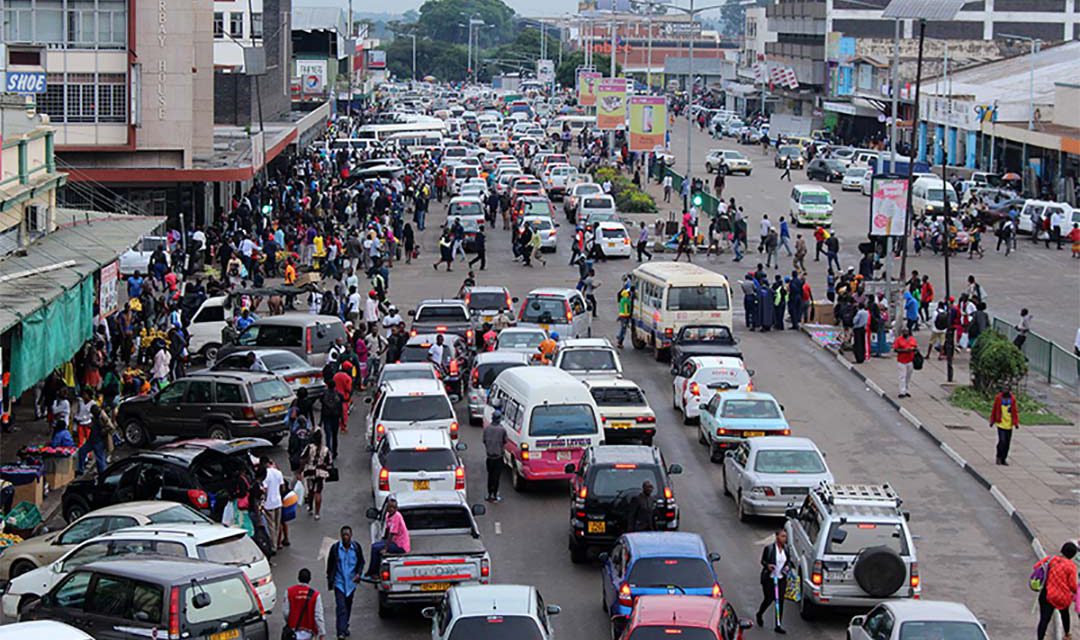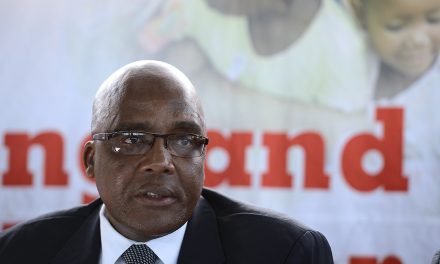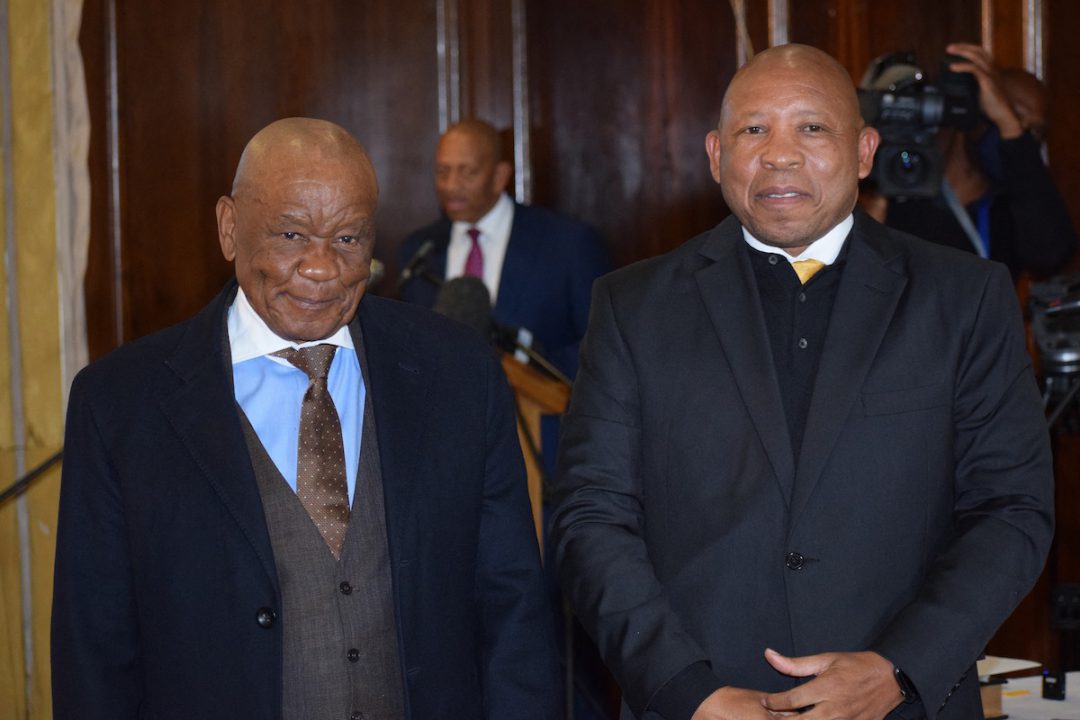The collapse of the economy has seen thousands of traders flooding into Harare
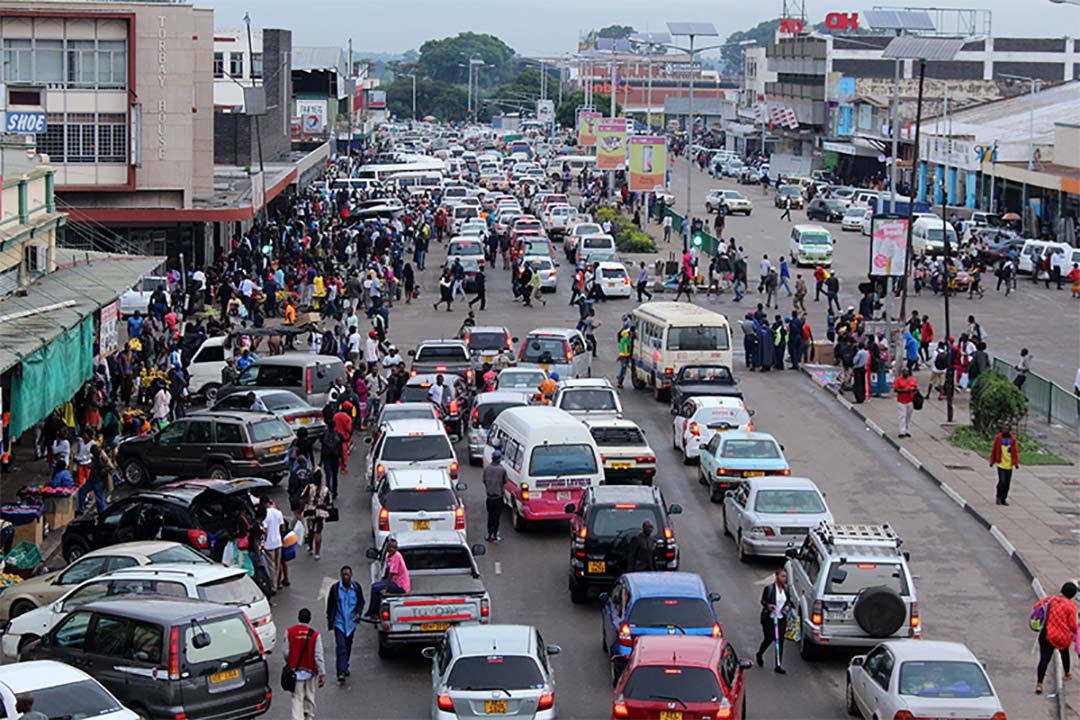
Downtown Harare. PHOTO Sadat Sanhehwe
Zimbabwe’s economy has seen a drastic collapse since 2000. Once a fairly highly industrialised country, Zimbabwe is now a vast informal economy after the collapse of its once-thriving manufacturing and agricultural sectors.
Industry is operating at 30% of its capacity. Since 2011, more than 6,000 companies have closed shop, rendering hundreds of thousands unemployed, according to a 2016 Confederation of Zimbabwe Industries (CZI) study. The CZI is the umbrella body of the manufacturing industry.
Hundreds of thousands of school leavers are graduating with no hope of formal employment, the CZI says. Unemployment now hovers around 85% and for many, the only hope is now in the informal sector.
With the late President Robert Mugabe holding onto power for 37 years, the chances of any respite are next to zero even under President Emmerson Mnangagwa. Mugabe is credited with lording it over a dying economy rife with corruption, fraud and tenderpreneurs, who are mostly politicians and well-connected party supporters.
Harare, Zimbabwe’s capital, has historically prided itself as being Africa’s “Sunshine City”; its once- gorgeous First Street Mall was often referred to as “little London”. Its infrastructure and service provision were without comparison in the region outside South Africa.
Harare was a functional and hopeful city; it was peaceful, safe and pretty, especially with its jacaranda trees in full purple bloom. But no longer. The sun still shines, but more likely in anger as it looks down on an unsightly mess. Thousands of desperate informal traders, or vendors, have flooded into the city centre to sell all manner of goods in front of high-street shops. It’s only a matter of time before grinding mills – used for grinding maize into the staple, mealie meal – line up along First Street, adding their roar to the dissonance of vendors’ competing megaphones, touting underwear and affordable perfumes.
All this informal and largely unregulated activity, which offers all manner of products and services, including toiletries, motor vehicle spares and basic foodstuffs for sale to passersby, is seen as the “dark side” of the economy. Yet for many Zimbabweans it is a crucial resource for survival, given the collapse of formal employment.
“The best thing that ever happened to me is this stall,” says Marjorie Kandawa, a clothing vendor in her early thirties, who runs an informal business near Harare’s Copacabana bus terminus, in the central business district. Her selection of used clothes is spread out on the street, half of which she and her fellow vendors have taken over.
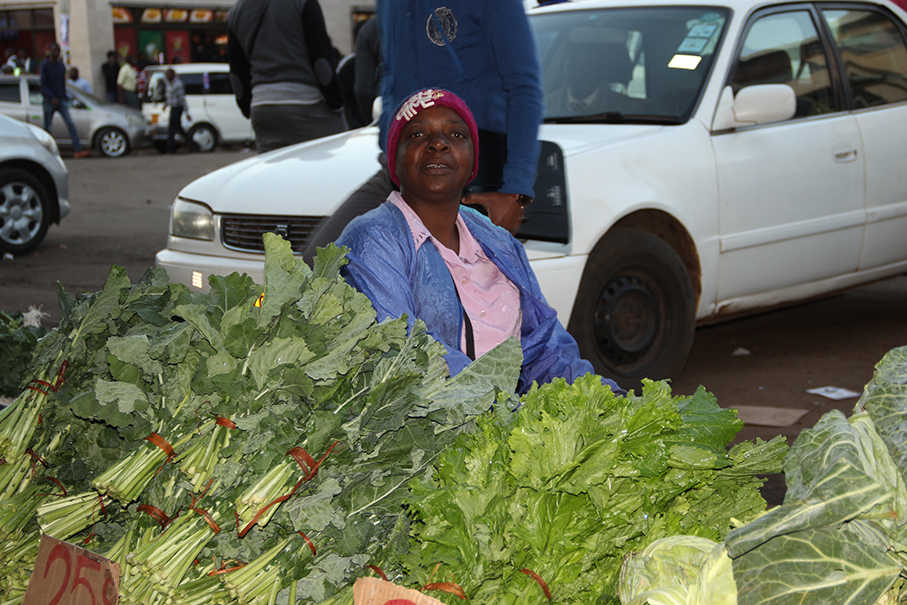
Vegetable seller Shorai Kavhute, Harare © Sadat Sanhehwe
Kandawa says she used to be a clothing designer for a leading retail group, but cheap clothes from China and elsewhere had rendered her industry redundant. “But when the going gets tough, the tough get going,” she says with a smile.
As she is interviewed, she continues to shout out the prices of her wares to passersby, competing with the din of traffic and hooting motorists – as well as the voices of fellow vendors calling out the virtues of their own offerings. Along the street, the goods and services on offer include clothes, agricultural produce, electronic goods, cosmetics, kitchen utensils, spices, fast foods, street photography and even farm implements.
Michael Hodobo, a young man barely out of his teens, is busy roasting fresh mealies (corn cobs) in the city centre. He says he has a bachelor’s degree in marketing from the University of Zimbabwe, but has never had a formal job. “My brother,” he says, “the only marketing I am now doing is of these mealies. But I am making a living from it!”
Another graduate, Hazel Mujuru, also in her early twenties, a psychology major, runs a thriving car-wash enterprise nearby with eight colleagues. Near the Machipisa Business Centre in Highfield, Emily Chikide, in her late forties, keeps a stall selling chickens, in competition with 12 others. Even so, she says, she earns about $400 a month from her business, after costs.
According to Stanley Zvorwadza, president of the Vendors Association of Zimbabwe, studies have shown that around 50% of the informal businesses are owner-run, with the other 50% staffed by employees. About 45% of the business owners earned $400 a month, 30% between $251 and $399, 15% between $100 and $200, and 10% less than $100 from their informal business activities. The cash is used for education, remittances, rent and buying food. About 50% earned enough to sustain their household needs.
The Zimbabwe Revenue Authority describes an informal trader as an “individual who carries on a trade for his own account from which he derives gross income of less than $6,000… This includes a hawker, street vendor, a person who sells articles at a peoples’ market or flea market, and a person who manufactures or processes any articles in or from residential premises”.
Confederation of Zimbabwe Retailers president Denford Mutashu says retailers are grappling with the challenges posed by the mass of vendors in the city centre. They have asked local authorities to ensure that vendors operate in designated trading areas, rather than occupying space in front of formally registered businesses, which they see as unfair competition.
“Harare has literally legalised vending carts. These, with illegal street vending, have given the retail business nightmares,” Mutashu says. He added that night-time vending was also “rampant” in other cities.
Across town in the sprawling high-density suburb of Highfield, a different type of informal business is underway. Here the clanking of hammer on metal is everywhere. Car mechanics, panelbeaters, wood and metal fabricators thrive here. “I run my own carpentry shop here,” says Laxon Zvakavapano, 37. “I employ five young men who help me out. Business is booming. Even if the economy were to change for the better, I will not seek employment elsewhere.”
This section of Highfield is called Engineering, a reference to the range of engineering or manufacturing trades underway here. Zvakavapano sells his products to the big furniture shops in the city. “The big companies which used to manufacture furniture have long ceased to exist,” he explains. “But we, the carpenters, are still around. Now we are producing the same quality products, but at less cost.”
Technology-savvy young men have ventured into new industries created by innovation. Computer and cellular phone sales and repairs, internet cafés and pirated music discs for resale, thrive.
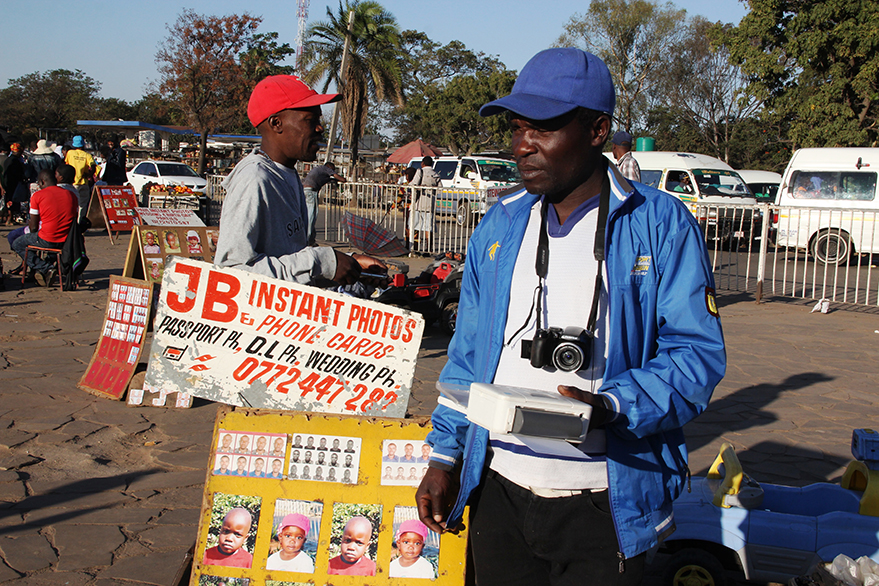
Photographer Britho Musara, Harare © Sadat Sanhehwe
According to a recently released BSA Global Software study, Zimbabwe has the highest percentage of pirated software on the planet. At virtually every corner of the capital, millions of pirated movies, music and pornographic videos and CDs are on sale.
Remembrance Dzapita, who lost his job last year, now manufactures and sells toiletries. “I started my business after realising that I could not get a new job but that I could earn more by developing a new line of toiletries to sell to local hotels,” he told Africa in Fact.
A 2016 study by the CZI found that at least 2.7 million people were making their living in the informal sector. According to economist John Robertson, Zimbabwe’s unemployment rate is more than 85%. Fewer than 900,000 people are formally employed, out of a population of 13 million. An estimated 200,000 jobs have been lost since 2004, as government has failed to stimulate the economy or to foster job creation.
The Zimbabwe National Statistics Agency (ZIMSTAT) pegs the country’s unemployment rate at 10.7%. But perhaps conveniently, ZIMSTAT defines unemployment as lack of any means of contributing to the country’s gross domestic product. Industry officials say the informal sector is thriving because it faces fewer regulations or taxes compared to the formal sector.
“In the informal and black market there are fewer regulations or taxes, so costs are low,” Mutashu says. “The formal sector is overtaxed and laden with rules, regulations and red tape. That’s why it is shrinking while the informal sector is flourishing.”
A 2016 study of the sector by the Bankers Association of Zimbabwe and the Zimbabwe Economic Policy Analysis and Research Unit found that although people active in the informal sector had few resources in isolation, they could become a formidable source of resources when combined.
“Banks should thus engage informal sector players and embrace the idea of fostering partnerships and clusters,” according to the study. “Under this arrangement, informal sector players, through the assistance of banks, pool their resources by bringing their capital and expertise together to make a meaningful investment. This also allows them to gain more knowledge and skills from their partners than when operating as individuals.”
According to the African Development Bank (AfDB), organising the informal sector and recognising its role as a profitable activity may contribute to economic development. This can also improve the capacity of informal workers to meet their basic needs by raising their incomes and strengthening their legal status. According to the AfDB, little attention has been paid to the role of the informal sector in fostering growth and creating jobs.
In fact, the informal sector contributes about 55% of sub-Saharan Africa’s GDP and 80% of the labour force. “Nine in 10 rural and urban workers have informal jobs in Africa and most employees are women and youth. The prominence of the informal sector in most African economies stems from the opportunities it offers to the most vulnerable populations such as the poorest, women and youth,” the bank says.
The Zimbabwean government has finally realised the importance of the informal sector, and is making moves to tax informal traders. In his national budget last year, Finance Minister Patrick Chinamasa announced government plans to tax the informal sector by levying a presumptive tax on landlords whose premises are leased by the traders.
Respected economist Witness Chinyama, however, doubted the efficacy of the move. “The problem with trying to formalise the informal sector is that the informal sector will simply go underground and the economy will go down as well,” Chinyama told Africa in Fact.
Another economist, Francis Mukora, urges caution. Taxing the informal sector might sound like a great idea to the broke Zanu-PF government, he says, but there are no quick fixes to the country’s multi- faceted crisis.
Barnabas Thondhlana has worked for Dow Jones and Bloomberg newswires as their Zimbabwe correspondent. He is the publisher of three community newspapers and a national daily, and a media trainer in investigative journalism. He has been instrumental in the formation of several independent newspapers, including the Zimbabwe Independent, The Daily News, The Daily News on Sunday, Newsday and The Observer.

